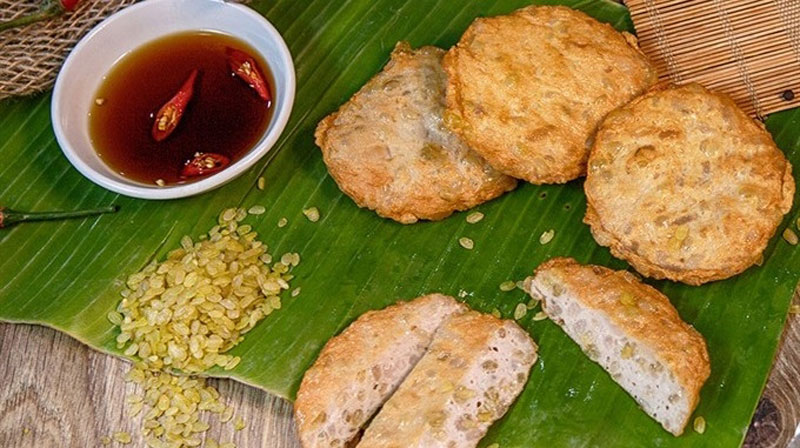
Hanoi’s autumn is also the season for ‘com’ or young sticky rice flakes. ‘Com’can be eaten directly or mixed with other food ingredients to create a variety of tasty dishes, including ‘cha com’ (com paste).
|

‘Cha com’is mainly made of ‘com’ and has
the subtle scent of new rice. Other ingredients for the dish include lean
pork and pork paste.
The meat to mix with ‘com’
should be lean shoulder pork, which contains fat, so the taste will not
become too dry or the dish downsized on being fried. The mixture will then be
added with salt, seasoning and delicious fish sauce. It will be left to
absorb all the spices for less than ten minutes.
After that, the mixture is
kneaded into small pieces and steamed from 15 to 20 minutes. Finally,cha comis fried until it becomes light
brown on both sides. According to experienced cooks, instead of being placed
on the plates, pieces of cha com should be arranged on lotus leaves to absorb
the subtle scent of the lotus, the symbolic flower of Hanoi.
The dish is best when the skin is
crisp, ‘com’
inside soft and the fragrance of the grain mixed with lotus. It can be dipped
into chilli or fish sauce to be eaten with cooked rice or rice noodle. |
Source: NDO
Spanning thousands of hectares and winding gracefully along mountain slopes, hillsides, and riverbanks, the terraced rice fields of Lac Son District present a stunning and captivating beauty. This region, renowned for its remarkable terraced landscapes, is also the centre of Hoa Binh Culture known for numerous archaeological sites.
The life of Mong people in Hang Kia and Pa Co communes of Mai Chau district has improved much thanks to tourism development.
The man-made Hoa Binh Lake, with a water surface area of approximately 9,000 hectares and a capacity of 9.45 billion cubic meters, stretches over 200 kilometers from Hoa Binh to Son La provinces. With the goal of developing into a national tourism area, the Hoa Binh Lake tourism area is expected to not only become the largest tourism centre in the province but also one of the 12 key tourist destinations in the northern midland and mountainous region of Vietnam.
Da Bia hamlet, now Duc Phong, in Tien Phong commune, Da Bac district, was once almost isolated from the outside as the only way to the hamlet was to get a boat ride across the Hoa Binh reservoir. However, as its tourism potential has been unleashed, the hamlet has established itself as one of the most attractive destinations on the tourism map. It has even received the ASEAN Community-Based Tourism Awards in 2019.
In the first 9 months of 2024, Mai Chau district, Hoa Binh province welcomed over 684 thousand visitors to visit and relax. In which, over 516 thousand domestic visitors and more than 168 thousand international visitors. Total revenue from tourism is estimated at over 821 billion VND.
Da Bac district, bestowed with stunning landscapes, is developing ecological and resort tourism offerings. Several tourist sites, put into operation this year, has attracted throngs of high-spending and young domestic visitors.


